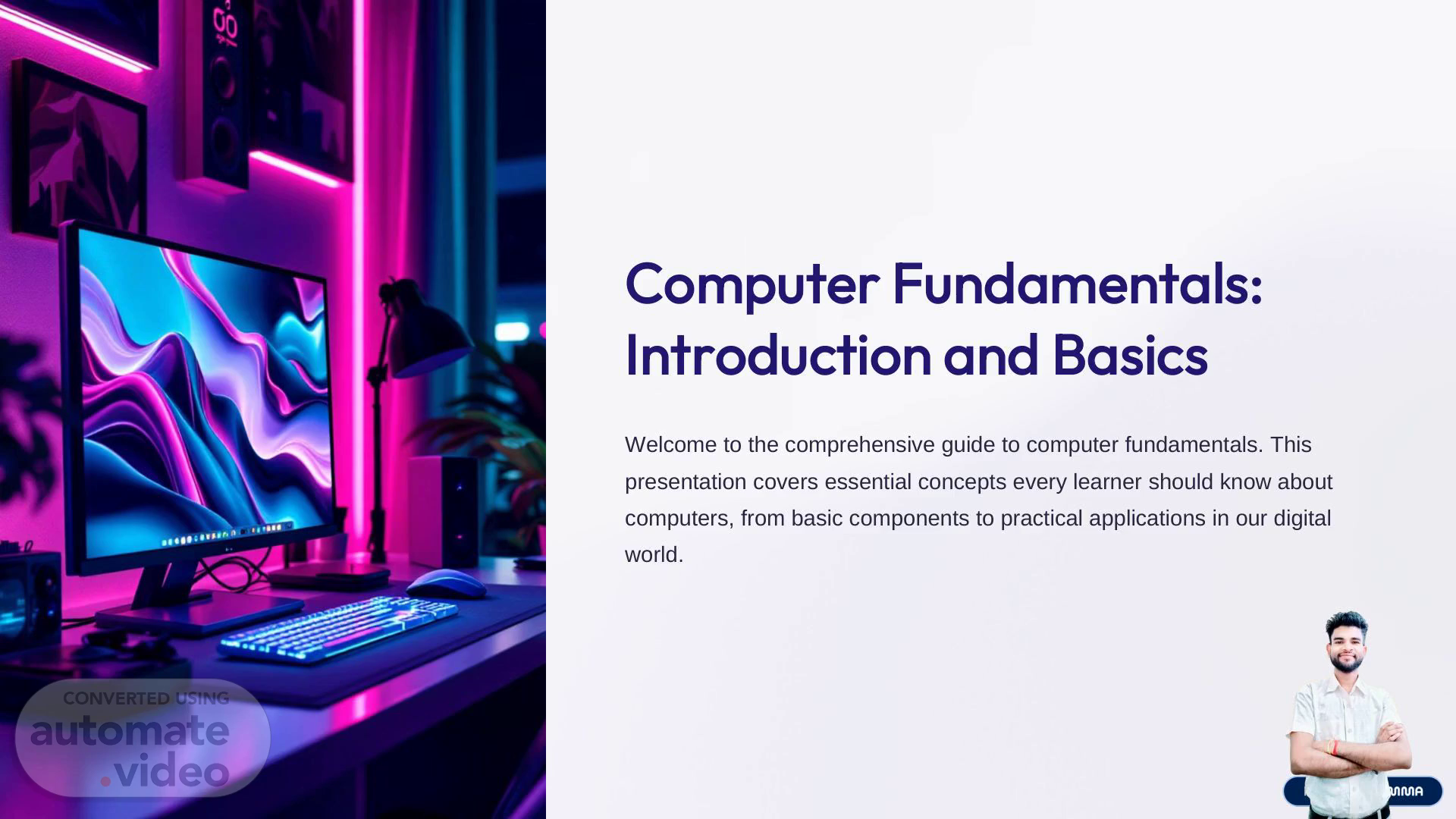Scene 1 (0s)
[Audio] Computer Fundamentals: Introduction and Basics Welcome to the comprehensive guide to computer fundamentals. This presentation covers essential concepts every learner should know about computers, from basic components to practical applications in our digital world. preencoded.png.
Scene 2 (20s)
[Audio] What is a Computer? A computer is an electronic device that processes data and provides information as output. Think of it as a sophisticated Data Processor that follows instructions to transform raw data into meaningful results. Computers accept input, process it according to programmed instructions, and deliver output in various forms - whether text, images, sounds, or actions. preencoded.png.
Scene 3 (51s)
[Audio] Main Components of a Computer Input Devices Processing Unit (CPU) Keyboard, mouse, scanner, microphone - these devices allow The brain of the computer that executes instructions and users to enter data and commands into the computer system. performs calculations. Often called the Central Processing Unit. Output Devices Storage Devices Monitor, printer, speakers - these display or present the Hard drives, USB drives, cloud storage - these permanently processed information to users in various formats. store data and programs for future use. preencoded.png.
Scene 4 (1m 35s)
[Audio] Data Processing Cycle Data Capture Information is entered through input devices Processing CPU processes the data according to instructions Output Results are displayed or presented to the user Storage Data and results are saved for future use Example: When you type on a keyboard, the computer processes your keystrokes and displays the text on screen, then saves your document to storage. preencoded.png.
Scene 5 (2m 3s)
[Audio] Key Characteristics of Computers Speed Accuracy Automation Computers can perform millions of When properly programmed, Once programmed, computers can operations per second, processing computers produce precise results work automatically without constant vast amounts of data quickly and without human errors in calculations. human intervention. efficiently. Diligence Memory Computers never get tired or bored - they maintain Computers can store and retrieve vast amounts of consistent performance over extended periods. information accurately and instantly. preencoded.png.
Scene 6 (2m 45s)
[Audio] Evolution of Computers 1 1642: Mechanical Beginning Blaise Pascal created the first mechanical calculating machine, marking the start of computational devices. 2 1940-1950: Electronic Era The first electronic computers like ENIAC emerged, using vacuum tubes and occupying entire rooms. 3 1970s-1980s: Personal Computing Microprocessors enabled the development of personal computers, bringing computing to homes and offices. 4 Today: Mobile & Cloud Smartphones, laptops, and cloud computing have made powerful computing accessible anywhere, anytime. preencoded.png.
Scene 7 (3m 39s)
[Audio] Software and Hardware Introduction Hardware Software The physical components you can touch: The programs and instructions that control hardware: Monitor, keyboard, mouse Operating Systems (Windows, macOS) CPU, motherboard, RAM Applications (Word, Excel, Games) Hard drives, cables, ports System utilities and drivers preencoded.png.
Scene 8 (4m 10s)
[Audio] How Does a Computer Work? 01 Instruction Fetch CPU reads instructions from memory, determining what operation to perform next. 02 Instruction Decode CPU interprets the instruction and prepares the necessary components for execution. 03 Execute Operation CPU performs the actual operation - calculations, data movement, or logical operations. 04 Store Results Results are stored in memory or sent to output devices for display or further processing. This cycle repeats millions of times per second, creating the seamless computing experience we rely on daily. preencoded.png.
Scene 9 (4m 59s)
[Audio] Uses and Importance of Computers Education Business Communication Entertainment Online learning, research, Data analysis, financial Email, social media, video Gaming, streaming, digital art, digital libraries, and interactive management, communication, conferencing, and instant and multimedia content educational software transform and productivity tools drive messaging connect people creation provide endless how we learn and teach. modern business operations. across the globe instantly. entertainment possibilities. preencoded.png.
Scene 10 (5m 41s)
[Audio] Conclusion and Future Pathways Why Learn Computer Fundamentals? Understanding computers is essential in our digital world. It builds logical thinking, problem-solving skills, and opens doors to countless opportunities. Career Opportunities From software development to data analysis, cybersecurity to digital marketing - computer knowledge creates pathways to exciting careers. Thank You! Continue your learning journey and explore the endless possibilities that computer knowledge brings to your personal and professional life. preencoded.png.
